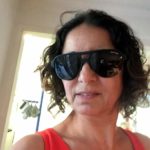
Six questions to Adina Paytan

Adina Paytan is a Research Professor at the Institute of Marine Sciences, University of California, Santa Cruz. The major focus of her research is understanding past and present marine biogeochemical cycles.
Adina was born and raised in Israel. After completing mandatory military service and then spending two years hiking the Himalayas in India and Nepal, she returned to her studies, obtaining first a B.Sc., and then Masters degrees in Science Education (Weizmann Institute of Science, Rehovot) and Oceanography (Hebrew University of Jerusalem). In 1989, Adina left Israel for California to undertake a Ph.D. on marine barite as a recorder of oceanic chemistry, productivity and circulation at the Scripps Institute of Oceanography in San Diego. Six years later, she started a post doc at UCSD, this time producing a high resolution sea water S isotope curve for the past 120 Ma. In 1999, she moved to Stanford, where she worked for 8 years as a professor in the department of Geological and Environmental Sciences. Today, Adina is a research scientist at the Institute of Marine Sciences at the University of California Santa Cruz and is affiliated with the Departments of Earth and Planetary Sciences and Ocean Sciences, where she teaches and mentors students.
1. What or who inspired you to become a geochemist?
I never knew what I wanted to do when I grew up (still not sure I know…) but I was always curious, asking questions, and fascinated by what I observed around me – the mountains, deserts, ocean, and sky, and all the organisms that are so well adapted to the environment they live in. When I got introduced to geochemistry as an undergraduate student I realized that geochemistry provides an amazing tool-box with an endless number of exciting toys that you can use to understand how the world around you operates now, how it operated in the past, and how people are changing it. It is fun, like solving a big complex puzzle.
2. How do you think the field has changed since you were a student?
The field of geochemistry has become a lot broader and it now branches and integrates with many other fields. If you just look at the science sessions that were included in the last Goldschmidt conference you will find in addition to “traditional geochemists” a lot of biologists, hydrologists, archeologists, climate scientists, atmospheric scientists and even geochemists working with professionals in the medical field. For the first time we also had sessions focused on science education and outreach. Definitely not only phase diagrams, stability fields, and isotopic fractionations.
3. Which career choices were the most important?
I am not sure how one would define “important” career choices…. and certainly my career path was not always determined by my own choices. We make a lot of decisions every day, some are trivial and others you find years later had fundamental impacts on your life. For me for example deciding to leave Israel to go do my PhD in California was an important career choice – while I did not plan to stay there, 20 years later I am still living in the USA. Similarly, when I did not get tenure at Stanford University, presumably because my science was not having an impact, I decided to take a soft-money, non-tenure track, position at UCSC, instead of a tenured position elsewhere, because I thought that moving would not be good for my family – again little did I know that more than a decade later I would still be having to raise all of the money to support my research, myself, my students and post-docs. Neither of these decisions that turned out to be very important to my career seemed like they would be that crucial at the time they were made.
4. What has been your greatest obstacle?
I find that many scientists in our field tend to think that there is only model for being a good scientist and that is to be a world expert in one thing or another. For me, doing science is a means of learning new things so I do a lot of different things and in particular I am fascinated by questions that cross disciplines, which allows me to work with other people. I think that this makes it harder to find jobs, get funding, or to be recognized for your contributions.
5. What inspires or motivates you?
To see my students get excited about their work and flourish.
To talk to students or other scientists about their work and be able to offer some insight that is useful for them.
To be able to look at complicated data sets and come up with an original interpretation that is consistent with all the data.
To try and tackle fun and exciting questions that have not been previously studied and even better to come up with such questions myself.
To be able to talk about science and the environment with people who are not scientists and have a positive impact on their ideas or actions.
6. What qualities do you look for in a potential PhD student?
First and foremost, I am looking for students that are genuinely excited about science, motivated and willing to take ownership of their projects. They should be collaborative, have integrity and intellectual honesty. I do not care if they are straight A students or if they have a strong background in the field but I expect them to be capable of learning and happy to share their knowledge with others.
Interview carried out by the EAG Communications Committee
